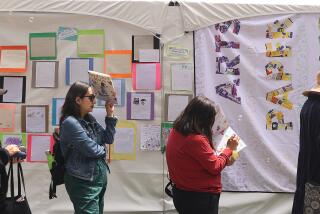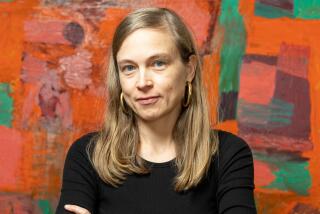Douglas Kearney says winning a Whiting Writers’ Award is a fresh start
Like everyone else at the Old Dominion Literary Festival, Southern California poet Douglas Kearney had turned his ringer off. So when a stranger called and left an undecipherable message, Kearney, preparing for his reading, didn’t think much of it. As a result, he was late to learn he’d won a $50,000 Whiting Writers’ Award.
Poets apply for many things: graduate school, grants, residency programs, prizes, faculty positions. They seek places to publish their work, sending poems to contests, magazines, editors.
The Whiting Award, though, does not accept applications. The names of its judges are never revealed. Until the recipients are publicly announced, five weeks after they are told, they too are sworn to secrecy. (Kearney asked if he could tell his wife; they agreed that he could.)
Every year since 1985, 10 writers -- of fiction, poetry, nonfiction and drama -- are honored. Because this is a prize for emerging writers, it may take some time for its winners to become household names -- although many do. Among those who have received a Whiting are Denis Johnson, August Wilson, William T. Vollmann, Jonathan Franzen, Suzan-Lori Parks, David Foster Wallace and Tony Kushner.
“Getting this award,” Kearney said last week from New York, where he’d gone for the Whiting ceremony, “is a beginning and not an ending. I really feel like I can keep pushing.”
Kearney is a pure product of Los Angeles; the resident of Van Nuys teaches at CalArts and is published by the Southern California press Red Hen. His poetry, which walks the line between print and performance, often deals with issues faced by an African American man in contemporary society. Kearney’s first book, “Fear, Some,” came out in 2006, and he has just completed edits on his second, “The Black Automaton,” due out next year.
“What Doug’s articulating is the fragmentation of the self and sensibility that you see prominently in T.S. Eliot and ‘The Waste Land,’ ” says USC professor David St. John, a champion of Kearney’s work. “He’s at the other end of the century, using a multicultural voice inflected with the concerns of what it means to be a young black man at this time and at this place.”
Kearney grew up in Altadena, attended Pasadena’s John Muir High School and got his bachelor’s degree from Howard University; he subsequently moved, with his wife-to-be, to San Diego. There, in a workshop that had poets read their work aloud, he began to think about the connection between text and performance.
“I really wanted to create work that would operate on the page and on the stage in a similar sort of way,” he says. He honed his skills as a performance poet, thinking about the tensions between a spoken poem and a written one.
What evolved is something Kearney calls “performative typography.” In “The Black Automaton,” a 2008 National Poetry Series winner, his poems splay out across the pages in an eruptive mix of font sizes and styles, with arrows inserting text and directing flow.
Sprinkled throughout are pop culture references and quotes from rap songs -- which, in hip-hop fashion, Kearney calls “sampling.” Some of these poems look like starbursts.
“Think of it as two-dimensional kaleidoscope of voice,” St. John says, “a different kind of verbal energy.” In the starburst poems, “the voice is shifting slightly, refracting as you go around; when the cylinder of the poem turns, there’s a whole new experience of what the voices gather into.”
Kearney is also a librettist, which takes the issue of poetry and performance to another level. Over the summer, his collaboration with composer Anne LeBaron, “Sucktion” -- about a woman’s cybererotic transformation by vacuum cleaner -- premiered at REDCAT.
“The moment you hear somebody else read your work, and they’re happy to be doing so, it’s stunning,” he says. “This opera thing is great.”
Kearney’s energy and enthusiasm spur a creative curiosity, not just about voice but about place. “I’m interested in writing about Los Angeles,” he says, and particularly about the point “where violence and the entertainment industry meet.”
Lately, this has led him to a critical analysis of Hollywood, and of westerns in particular; a western libretto may be on the horizon. But his inquisitiveness could take him in any number of directions, following ideas like the crisscrossing arrows of his poems.
Do the mysterious Whiting judges have a knack for finding America’s best budding writers? Or does the size of the cash award give young authors the kind of financial footing they need at a critical point in their careers to focus on their work?
When it comes to Kearney, it’s too soon to tell. But so far he is keeping his head down. “I’m trying to figure out a kind of language that will allow me into writing some new poems,” he says.
Then, paraphrasing something he once heard from St. John, he repeats the mantra of a man who continues to push for the new: “Every new poem is an opportunity to destroy my career.”
Kellogg is lead blogger for Jacket Copy, The Times’ book blog.
More to Read
The biggest entertainment stories
Get our big stories about Hollywood, film, television, music, arts, culture and more right in your inbox as soon as they publish.
You may occasionally receive promotional content from the Los Angeles Times.







